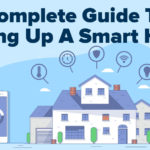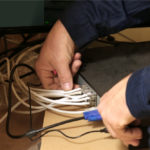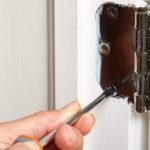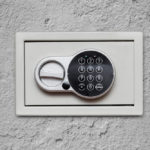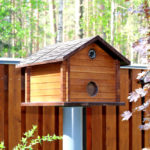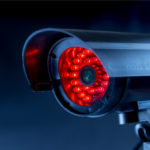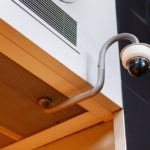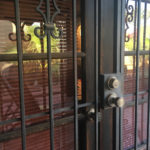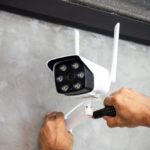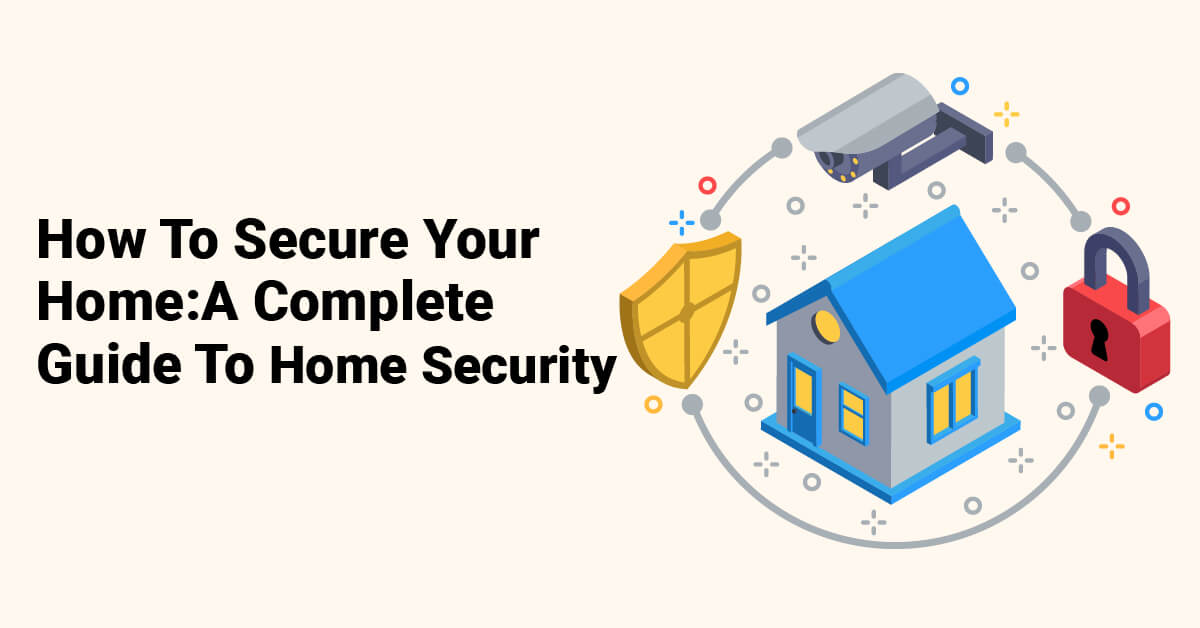
Introduction

With the latest advances in surveillance and security technology, securing your home is easier than ever. There’s no better time to protect yourself, now that you can get sophisticated gadgets delivered to your door and installed with relatively little time, money, and effort spent.
In this guide, we’re covering how you can turn your home into a modern-day fortress. We’ve split the guide into three main sections that address the different concerns a protective homeowner may have:
-
The Importance Of Securing Your Home
-
How To Secure Your Home
-
Other Tips To Secure Your Home
These cover everything you should know when transforming your home and taking other steps to invest in your safety. When the safety of you and yours is on the line, you should be wary of information you read online. Nobody wants to get bad advice and end up at risk. To that end, we’ve included references so you know we’re giving you nothing but factual, verified information.
Now that we know where we stand, let’s look at why you should secure your home.
The Importance Of Securing Your Home
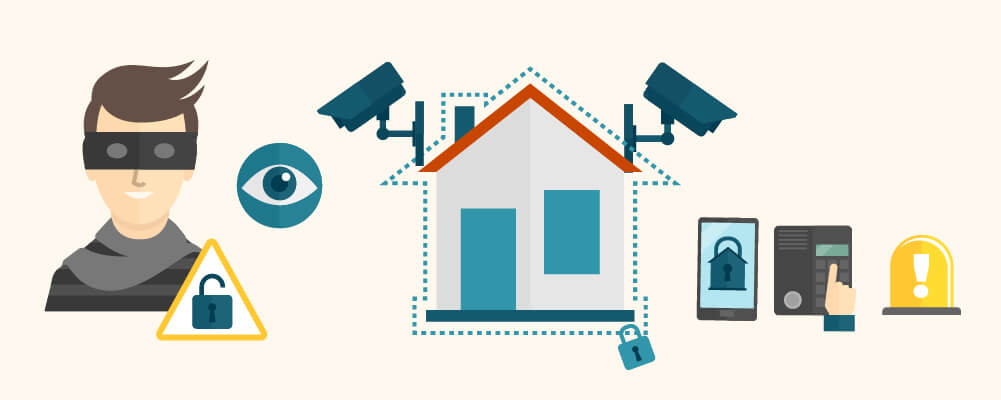
While crime tends to intensify and ebb in waves, criminality has been decreasing over the last few decades. Theft and burglary are the most common crimes committed while violent and property-related offenses have been on the decline. So, why should you secure your home?
Well first, you don’t want to tempt fate. There’s a big difference between statistics and your own lived experiences, so you should still take precautions so you don’t become one of those burglary statistics or worse. As a homeowner, it’s prudent to protect your property and those in it. Remember that many burglaries are crimes of opportunity too, so you don’t want to leave the door open for any greedy chancers in your area.
It’s generally known that there are mental health issues that happen after burglaries and home invasions that transcend losing physical property. When somebody encroaches into your private spaces, victims often develop paranoia and trust issues, along with feeling that they could have prevented it.
Nobody should have to experience that in response to being victimized. While everybody processes trauma differently, the surest way to avoid feeling those emotions is by protecting your home and preventing the crime from happening in the first place.
There’s also the threat of losing personal possessions. Burglars aren’t bursting into your home to haul away your largest, most expensive possessions. Many of them find a way in and look for the small things that fetch a good price. These can be jewelry, which often has sentimental value alongside material value or things like credit cards or smartphones that have more personal implications if they get into the wrong hands. If you know a trade and keep tools around, they’re also a popular target for thieves. Homeowner’s insurance might cover the cost of those items but that’ll increase your insurance rates and won’t cover the personal or sentimental worth of items lost.
Then there’s the most important reason that you should secure your home – for your safety. Not every home invader is a thief or a burglar and the best way to keep them out is by setting up a robust security system in your home that doesn’t discriminate against any intruders, whether they’re petty thieves or something far more sinister.
How To Secure Your Home
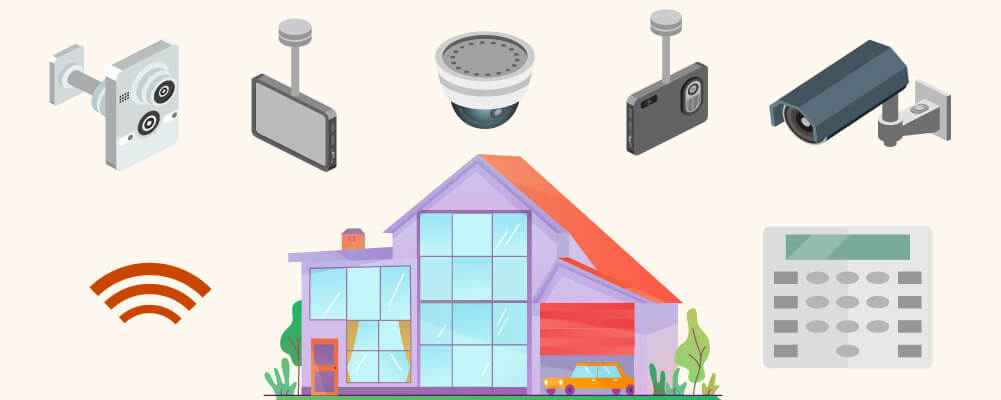
Now that you’re aware of just how important home security is and why you shouldn’t be complacent, let’s go through how you secure a home. We have eight tips below that will go a long way in burglar-proofing your home. Put them into practice to ensure that nobody enters your house except you and those who have permission.
Secure Your Windows & Doors
You don’t need to be a security expert to figure out that entryways are key to protecting a location. You should make sure all doors and windows are protected against those who would want to lockpick or break their way in.
We commonly lock our doors and take other measures to strengthen them but window protection is often forgotten about. They shouldn’t just be shut; they should be locked too. The latches on most windows aren’t that strong, a decent crowbar and a stiff elbow can make short work of them, so you should get reinforced latches or key-operated levers that make opening the windows impossible without the right gear.
Along with that, you can also reinforce the materials used to make the glass. Glass doesn’t come in one type, there are several, and some are layered or threaded with PVC or wiring that make them much, much harder to break. Even if they break on the surface, an intruder isn’t making a hole large enough to slide through.
You can also put wiring or bars on the inside or outside of the window to keep would-be burglars away. It can look draconian but safety is better than having curb appeal, and you can always get shaped bars and paint them to make them look better.
While you’re doing some landscaping, you can plant shrubbery beneath the windows. They act as a natural alarm, creating rustling noises, but they also make it inconvenient for the burglar. You can even place prickly plant life that causes pain if you brush up against them!
Lastly, you can place sensors that go off when the windows are opened or the glass inside them is broken.
As for the doors, start with how the door is built. It should be a solid hunk of wood or plastic that can’t be kicked in. Doors give way at the hinges, so make sure they’re strong and protected by a plastic/wooden sleeve. If the door has a slot for receiving mail, try and reach through it and grab the door handle. If you can open the door through the mail slot then congratulations – you’ve been living without a front door this entire time.
If your home has previous owners, make sure you change the locks. You don’t want anybody out there to have keys to your home except you and your closest family. The locks should be modern, so they have all the bells and whistles that keep avid lockpickers at bay. Lockpicking is easier than you may think but a new lock affords the greatest protection. Make sure they are housed in a strike plate so the lock can’t be brute-forced. Then you should stick a deadbolt lock onto the door to add even more security.
If you’re dealing with a sliding door, like the ones that lead to a balcony or a patio, you should get purpose-built sliding door locks. They operate a lot like a deadbolt, beefing up the structural integrity of the door and ensuring that it can’t be jimmied open.
Installing some hardware is important too. You can add a keypad that requires a code to grant access past the door. You need to remember the code, which is harder the longer it is, so choose a code that you can easily recall.
You can add a video doorbell that transmits video to a computer or your smartphone when the doorbell is pressed. This allows you to see who’s at your door, even if you’re not at home, and often you can speak to them through a speaker too. Some even set up sound effects, like a dog barking, to scare away would-be thieves when the owners aren’t home.
Install Motion Detection Lighting
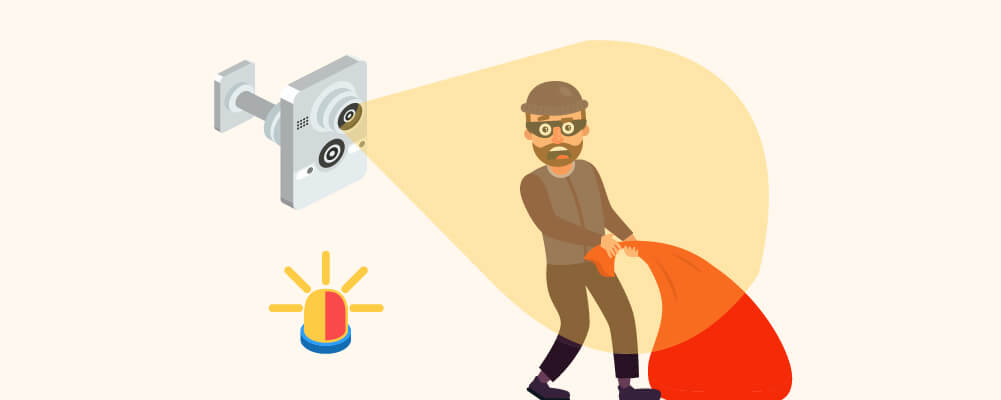
Next, let’s take a look at lighting. Like many other criminals, thieves, burglars, and home invaders prefer to do their crimes in the dark. Therefore, adding extra illumination to your property is a great way to keep burglars at bay. If a burglar decides to test his luck, illumination makes it more likely that you, your neighbor, or a concerned citizen will see them and alert the authorities.
Most people feel uncomfortable under the spotlight, especially those who have criminal intentions. If you have a backyard and a lawn that allows nighttime lighting, get some solar-powered lights and keep them out there. While the photovoltaic panels will degrade with time, solar lights don’t require recharging because they charge during the day, and most of them can be staked into the ground like tent poles.
You can also hang lights on the exterior walls of your home, especially at patios, balconies, garages, and other areas where there is an entryway into the house. Illuminating steps and stairways is a good idea too, just because it minimizes the risk of injury for you and your guests.
Lights can be motion-activated so they don’t disrupt the neighbors. When they sense movement on a large enough scale, they’ll turn on and catch any interlopers by surprise. The lights themselves can be dazzling and disorienting to an intruder if they’re bright enough. Through the use of a smart outlet and smart lightbulb technology, you can also place outdoor lights on a timed schedule so that they turn on or off at certain times of the day.
Add Alarms
This is the first thing that people think of when they try to secure their homes. Adding alarms is useful but it’s actually the last line of defense for your home. If an alarm has been tripped, the burglar has already ignored any deterrents and has tried to rob your home. The best protection stops burglars from even trying in the first place.
That said, everybody should have alarms for those cases where the burglars do try their luck. For the best protection, you should make burglar alarms visible to outsiders. This may seem counterintuitive since the bad actors can now see your alarm, the brand/model, positioning, and other pertinent details.
The truth is that your garden variety criminals aren’t geniuses capable of hacking or deconstructing your alarm system. Most modern alarm systems have tamper-proof technology built into them and going through the trouble of bypassing the alarm often isn’t worth the effort anyway.
Unless you’re holding something really valuable and being targeted by professionals who know what they’re doing, you won’t have to worry about somebody getting past the alarm. Most criminals will see that you have alarms and try their luck somewhere else, where there aren’t any alarms. Visual deterrents like alarms are vital for home defense, psyching out potential criminals before they even try messing with your property.
When getting an alarm system, you should find out crime statistics from your local police to see which type of criminal activity is most popular with the neighborhood crooks. Then get your home evaluated by a security professional to figure out which system works best for you.
Install Cameras
Like alarms, cameras are also a popular visual deterrent. They come with the added benefit of cataloging any activity around your home. You could even catch suspect individuals casing your joint before they even try anything, which could help with identifying them should they make a theft attempt. This deterrent doesn’t just keep criminals at bay, it helps catch them if they do pull off their heist.
Camera systems have become much more affordable over the last few years, so they’re a great tool for a homeowners’ arsenal. Even if you can’t afford a system, one or two well-placed cameras can cover the weakest points of your home perimeter. Most of them have great connectivity features too, being able to connect to handheld devices like smartphones and tablets. With that connectivity comes the risk of hacking, so take steps to keep hackers at bay.
Commercial cameras typically come in PoE form. This means Power over Ethernet, which is where the camera is powered and processes data by a single cable, the same one used for LAN infrastructure. This eliminates the need for a power outlet and means that the cameras have a power supply every day, seven days a week.
In a best-case scenario, your cameras will have the following features:
-
Night vision capabilities for seeing at night.
-
Motion detection that can single out moving people.
-
Wi-Fi capability and other connectivity abilities.
-
Accompanying sound recording.
-
A microphone to speak through to visitors/scare intruders.
-
Appropriate data storage, either locally or on the cloud.
-
Weatherproofing, so the weather doesn’t break them.
Secure Your Garage
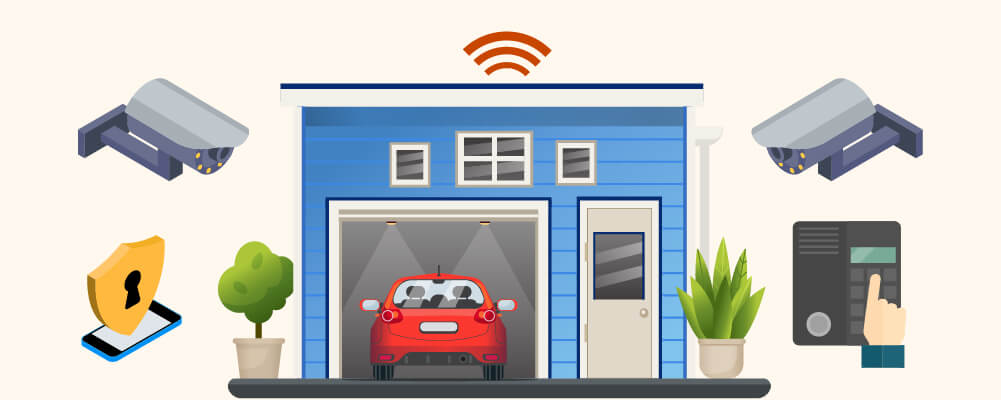
If you’ve taken an interest in home security, you may have heard that the garage is the preferred entryway of home invaders. This is generally true, especially if the door or a low-down window isn’t accessible. Any extension to your home should be as secure as the main building, if not more so, and this especially applies to garages.
First, something easy that homeowners often ignore. Lock the door that leads from your garage to the home. Many leave this door unlocked at night but this could be the final thing that stops an intruder in their tracks. It costs nothing to lock that door, so make sure you establish a barrier between your main home and installations like garages or conservatories.
Once that’s done, you should clean up the garage. If your garage has windows, you don’t want a treasure chest full of expensive, easy-to-carry tools visible from the street. You should keep valuables out of sight everywhere in the home. This makes intruders rifle through your belongings, making more noise and leaving more DNA evidence behind, so they’re more likely to get caught. If the goodies can’t be hidden, cover the garage windows.
Lock garage doors with a third-party locking mechanism that’s also tamper-proof. You can even upgrade to a smart garage door opener that installs on your phone or get a keypad that requires a security code before it opens. If your garage door requires a manual door opener, don’t keep it somewhere accessible.
Burglar-Proof Your Yard
A few paragraphs above, we mentioned that you can catch burglars casing your home if you install cameras. If you burglar-proof your yard, they won’t even get that far! The key to keeping intruders off your property entirely is fencing. Then you can also use lighting to scare careful crooks away or provide more visibility for those lending a watchful eye.
If you need to make your garden harder to access while also upping your curb appeal (because of those bars you’ve installed on your windows) then you can plant shrubbery, trees, and other visually pleasing plants that also make accessing the yard more difficult. The trick is to plant enough that they’re an inconvenience but not enough that they can be used as cover. Smaller flowers and bushes are better for this.
You should also do the following:
-
Keep chairs, ladders, and other potential climbing aids away from your home.
-
Lock any gates or outdoor buildings, like sheds, that are in your yard.
-
Don’t leave expensive gear in your yard.
-
Place security stickers and signs to ward criminals away. You can even use these if you don’t have a robust security system, most criminals won’t call your bluff!
Keep Your Valuables Out Of Sight
As we reach the end of our main tips for home security, you should always remember to keep valuables out of sight. Think like a potential criminal, look at your possessions and think about how much they cost. How much could you get for them if you tried to sell them right now? Those are the things that go through a criminal’s head before they try their luck.
When you have that mindset, don’t leave flashy or expensive items lying around. They’re not just great targets for a potential thief, they’re also a sign that you have disposable wealth. If you have expensive trinkets visible in your yard, who knows what you have inside? Signaling that you have wealth is dangerous when trying to keep your home safe. Get familiar with blinds and curtains to block the view inside your home from the windows.
If you do happen to have very valuable goods, like certain documents related to financing or precious metals, keep them in a household safe that’s protected by a code and disguised in the home.
Don’t Keep Car Keys/Garage Keys In Your Car
Lastly, this is a pretty simple rule. Don’t leave any valuables in your car, especially the keys to your home. It may be convenient to keep spare keys in the compartment of your car but those are a great target for criminals. All you need is a brick or a crowbar to break through most car windows.
If a criminal gets into your car, they won’t just pilfer all the valuables inside, they could also find keys that give them access to your home. Then they have full access to your home and the even more precious valuables within.
Other Tips To Secure Your Home
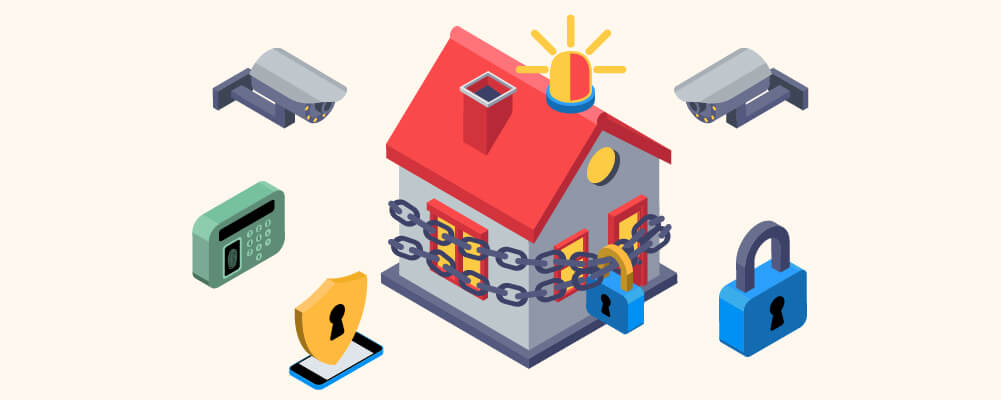
Now that we’ve covered the main tips that will keep your home safe, your house should start looking more like the fortress you want it to be. There’s always more you can do, however, so let’s take a look at some other tips you can use. These are things you can put into practice without spending too much money or making too much of a change in your life.
Install A Safe
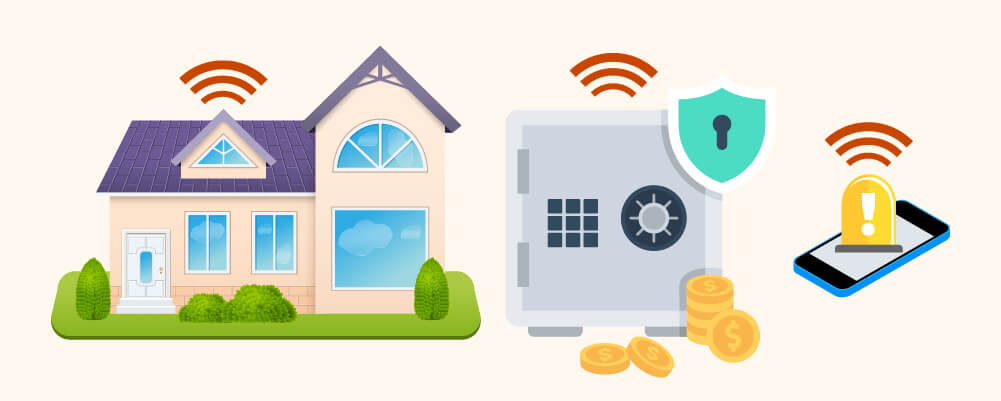
Let’s start with the one that we’ve already touched upon – owning a safe. It may seem odd to some, maybe even cliché, but there is still a place for a safe in many homes. If you keep a lot of cash or valuable physical assets at home, you should have a safe that keeps everything in the same place.
If you’re in a country that allows firearms, many store their guns and ammo in the safe too along with other valuables. Similarly, passports and other vital documents can also be kept, well, safe when stored inside these vaults. It doesn’t need to be large, a small safe will be good enough for most.
If you want to be fancier about it, you can also have the safe built into a wall or floor and then disguised by laying something over it. This adds another layer of protection since burglars won’t try to get into a safe if they don’t even know it exists.
Safes are fireproof, waterproof, just-about-anything-proof. Depending on your model, they can be protected by a keypad with a code or even biometric locking technology that only opens up for your fingerprint or eye scan. Try and get a model with a redundant lock (this means it has two locking systems, redundancy is a good thing in this case!)
Keep Your Spare Keys In A Lock Box
Since we’ve also talked about keys and where you shouldn’t keep them, let’s talk more about where you should keep them. Many keep their key collection by the front door, which can cause its own problems if somebody finds their way inside and finds them. Then they have access to everything that’s under lock and key in your home.
So, where should they be kept? The best option is a lockbox or a security box. Yes, it’s a tad ironic to keep a bunch of keys under lock and key but it’s easier to hide one key than several. If you have several keys that need hiding, grab a box and throw them in, then lock it and store the key somewhere that everybody knows.
The box doesn’t have to be fancy. You can get security boxes, like the ones you may have seen at motels or apartments for holding keys, or you can just use an old wooden box with a locking mechanism.
Consider Home Automation/Smart Home
While you’re taking a look at what’s inside your home and the security implications they bring, you may want to consider home automation. You may have heard of smart homes, where everything is connected to afford convenience and automate processes that happen across your household. For example, you could:
-
Talk through doorbells or cameras to alert people or scare intruders away.
-
Get a video feed of cameras onto your phone or television.
-
Check on alarms – not just security ones, smoke and carbon monoxide ones too.
-
Schedule lights and electronics to turn on or off at certain times, so the home powers down naturally and saves you money.
The security implications of this technology are obvious. That said, it does have some shortcomings.
While smart homes may be a convenient option for you, we also have a word of caution. Cybersecurity experts have stressed that there are concerns with the so-called Internet of Things technology, the term for where appliances and electronics are all connected, often shortened to IoT. When you link things together, you’re creating a chain. If there’s a weak link in that chain, something as simple as an interactive light, then a hacker could enter your home system through that light and move around your network freely, gathering data or subverting your security measures.
Of course, most opportunistic criminals aren’t capable of hacking, but it’s still something to be wary about. The criminals of the future may be more tech-savvy than the ones we deal with today. Here are some ways you can prepare:
-
Get a secured wireless router.
-
Rename it and hide it from public participation.
-
Establish a firewall.
-
Enable WPA/WPA2 encryption.
-
Get strong anti-virus/anti-malware protection.
-
Don’t use “password123” as a password. Try and combine upper case, lower case, numbers, and unique symbols if allowed to make a strong password.
Be Careful What You Share On Social Media
Here’s one you should keep in mind whenever you’re mindlessly scrolling through social media. The implications of life on social media are poorly understood. It isn’t a distant world that has no bearing on reality, things said on social media can be used against you. So, unsurprisingly, many criminals use social media to find their next target.
You may have heard of the classic example where somebody posts on Facebook or Instagram that they’re going on holiday or are on holiday right now. Then, to their shock, they get home and find out that somebody has helped themselves to their valuables while they were gone. How lucky was the criminal, to strike exactly when the owners were away? It wasn’t luck, it was social media.
First, restrict your social media accounts so only those you are friends with can see and interact with your posts. That narrows down the pool of potential suspects if something does happen.
Second, don’t advertise sensitive information! Think before you post. Once again, put yourself in a criminal’s shoes and look for opportunities when reviewing your profile. Have you said a little too much in your bio? Is the positioning of certain valuable items revealed in your photo album?
Consider Getting A Dog If You Don’t Have One
Our last tip is probably the most fun, if you’re a dog person, at least. If you’ve ever wanted to get a pet dog, now might be the perfect excuse to get one! Raising and caring for a dog is a huge commitment, of course, but they are also one of the top deterrents for criminals.
You can get any dog you want since it’s mainly the barking that scares the criminals away. Even smaller dogs, like Chihuahuas, are known to be great watch dogs that’ll bark away any strangers. If you want full protection, you’ll want to get a larger dog that can become a guard dog and meet any threats at the door with a big, toothy smile.
Summary
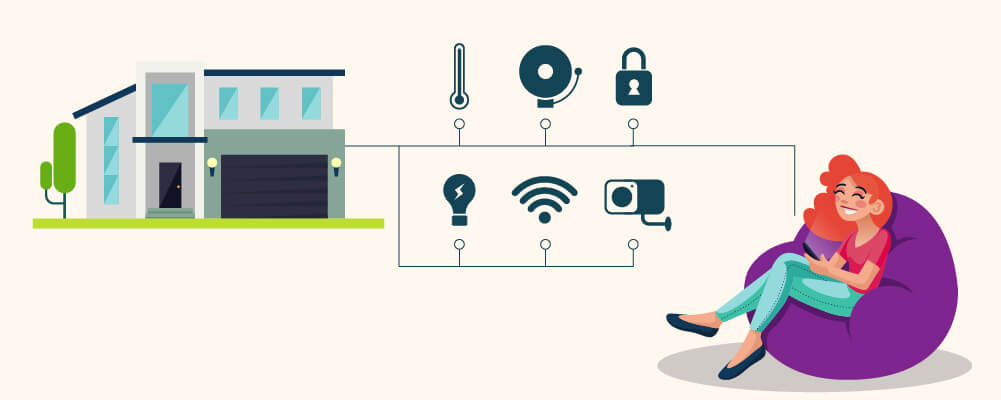
That brings us to the end of our guide – but your work has only just begun.
Now that you know how to transform your house into a secure place you can rely on, it’s time to put that knowledge into practice and take steps to protect you and your loved ones. Everybody should feel safe in their home but sometimes you need to take extra steps to get the safety you deserve.
Let’s recap what we’ve covered, so you know what to do:
-
Secure your doors and windows
-
Install lighting, preferably with motion sensors
-
Install alarms
-
Install cameras
-
Secure your garage
-
Burglar-proof your yard
-
Hide your valuables, consider a safe
-
Hide your keys
-
Consider smart home technology
-
Don’t advertise your home on social media
-
Consider a watch/guard dog
Some tips will be more relevant to your home than others. That’s natural, not every home can support every security measure. Try and implement as much of the list as possible, to maximize your home security.


